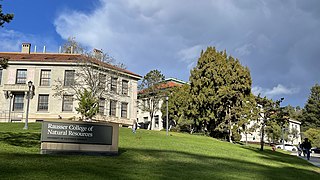Related Research Articles

Forestry is the science and craft of creating, managing, planting, using, conserving and repairing forests and woodlands for associated resources for human and environmental benefits. Forestry is practiced in plantations and natural stands. The science of forestry has elements that belong to the biological, physical, social, political and managerial sciences. Forest management plays an essential role in the creation and modification of habitats and affects ecosystem services provisioning.

The University of Akureyri was founded in 1987 in the town of Akureyri in the northeastern part of Iceland. It is today a school of health sciences, humanities and social science, and a school of business and science. Over 2000 students attended the university in the autumn semester of 2014, around half of them through flexible learning, making the university the largest provider of distance education in the country. The University of Akureyri coordinates with other Icelandic Universities to operate the University Centre of the Westfjords located in Ísafjörður, which operates two master's degrees, one in Coastal and Marine Management and the other in Marine Innovation. Additionally, The University of Akureyri coordinates with other Nordic Universities for the West Nordic Studies and Polar Law Masters programs.

Environmental studies is a multidisciplinary academic field which systematically studies human interaction with the environment. Environmental studies connects principles from the physical sciences, commerce/economics, the humanities, and social sciences to address complex contemporary environmental issues. It is a broad field of study that includes the natural environment, the built environment, and the relationship between them. The field encompasses study in basic principles of ecology and environmental science, as well as associated subjects such as ethics, geography, anthropology, public policy, education, political science, urban planning, law, economics, philosophy, sociology and social justice, planning, pollution control, and natural resource management. There are many Environmental Studies degree programs, including a Master's degree and a Bachelor's degree. Environmental Studies degree programs provide a wide range of skills and analytical tools needed to face the environmental issues of our world head on. Students in Environmental Studies gain the intellectual and methodological tools to understand and address the crucial environmental issues of our time and the impact of individuals, society, and the planet. Environmental education's main goal is to instill in all members of society a pro-environmental thinking and attitude. This will help to create environmental ethics and raise people's awareness of the importance of environmental protection and biodiversity.

The University of Natural Resources and Life Sciences, Vienna, or simply BOKU, founded in 1872, is an education and research centre for renewable resources in Vienna, Austria. BOKU combines expertise in the fields of natural sciences, engineering and biotechnology as well as social and economic sciences. In research and teaching, it focuses on
The following outline is provided as an overview of and topical guide to environmental studies:

Forestry laws govern activities in designated forest lands, most commonly with respect to forest management and timber harvesting. Forestry laws generally adopt management policies for public forest resources, such as multiple use and sustained yield. Forest management is split between private and public management, with public forests being sovereign property of the State. Forestry laws are now considered an international affair.
The University of Arkansas at Monticello College of Forestry, Agriculture, and Natural Resources (CFANR) is located within the Henry H. Chamberlin Forest Resource Complex on the University of Arkansas at Monticello campus in Monticello, Arkansas. The Chamberlin Forest Resources Complex also houses the Arkansas Forest Resource Center. The school employs 17 faculty and offers Associate of Science, Bachelor of Science, and Master of Science degrees.
The University of CalgaryFaculty of Law, at the University of Calgary. is a law school in Calgary, Alberta.

The Rausser College of Natural Resources (RCNR), or Rausser College, is the oldest college at the University of California, Berkeley and in the University of California system. Established in 1868 as the College of Agriculture under the federal Morrill Land-Grant Acts, CNR is the first state-run agricultural experiment station. The college is home to four internationally top-ranked academic departments: Agriculture and Resource Economics; Environmental Science, Policy, and Management; Nutritional Sciences and Toxicology; and Plant and Microbial Biology, and one interdisciplinary program, Energy and Resources Group. Since February 2020, it is named after former dean and distinguished professor emeritus Gordon Rausser after his landmark $50 million naming gift to the college.
The University of Forestry and Environmental Science (Yezin) (Burmese: သစ်တောနှင့်ပတ်ဝန်းကျင်ဆိုင်ရာ တက္ကသိုလ် (ရေဆင်း), pronounced[θɪʔtɔ́tɛʔkəθò(jèzɪ́ɰ̃)]), in Yezin near Nay Pyi Taw, is the only university specialized in forestry and environmental science in Myanmar. Founded in 1923 as the Forestry Department of Yangon University, in 1992, the University of Forestry and Environmental Science became a separate entity based in Yezin, Nay Pyi Taw. It mainly offers a five-year Bachelor of Science degree program in forestry and environmental science as well as two-year master's and three-year doctoral programs. The university is administered by the Ministry of Natural Resources and Environmental Conservation. Undergraduate students are required to take part in a field training program each winter from third year. Graduates of the university typically become forestry officers at the Forestry Department, the Dry Zone Greening Department, the Environmental Conservation Department or the Myanma Timber Enterprise. Others find employment in non-governmental conservation organizations such as FREDA, UNDP, UNEP, FAO, JICA, WCS, WWF, FFI as well as other local and international research institutions and conservation organizations.
The traditional MBA degree requires coursework and other study of business from a primarily financial standpoint, with some attention to management of people, to conventional economic theory, and to business ethics. A sustainable MBA program includes these subjects, and also study of managing for environmental and social sustainability. These programs are sometimes called "green MBAs".

The School for Environment and Sustainability is the school of environmental science and sustainability studies at the University of Michigan, a public research university in Ann Arbor, Michigan.
The College of Food, Agricultural and Natural Resource Sciences (CFANS) is one of seventeen colleges and professional schools at the University of Minnesota. The College offers 14 majors, 3 pre-major and pre-professional majors and 26 freestanding minors for undergraduate students and a variety of graduate study options that include master's, doctoral and joint degree programs.
The University of Maryland College of Agriculture and Natural Resources is the agricultural and environmental sciences college of the University of Maryland and operates the Maryland Sea Grant College in cooperation with the University of Maryland Center for Environmental Science and the National Oceanic and Atmospheric Administration.
The College of Natural Resources and Environment at Virginia Tech contains academic programs in forestry, fisheries, wildlife sciences, geography, and wood science. The college contains four departments as well as a graduate program in the National Capital Region and a leadership institute for undergraduates.

The Balsillie School of International Affairs (BSIA) is a centre for advanced research and teaching on global governance and international public policy, located in Waterloo, Ontario. As one of the largest social sciences initiatives in Canada, the school is a collaborative partnership between the University of Waterloo, Wilfrid Laurier University, and the Centre for International Governance Innovation. The BSIA is an affiliate member of the Association of Professional Schools of International Affairs, a group of schools that educate leaders in international affairs. The BSIA is housed in the north and west wings of the CIGI Campus. Admission to BSIA is highly selective.

The Lilongwe University of Agriculture and Natural Resources (LUANAR) is a university outside Lilongwe, Malawi. It was formed in 2011 by a merger between Bunda College of Agriculture of the University of Malawi and Natural Resources College (NRC).
Nancy D. Olewiler is a Canadian economist who is currently a professor at the School of Public Policy at Simon Fraser University. She is affiliated with numerous organizations such as Powertech Labs Inc., BC Hydro, Powerex Corp, TransLink, and the Center for Public Research. Olewiler has received numerous awards for her contributions in the education and environmental economics sector. She was most recently a recipient of the 2017 YWCA Women of Distinction Award for her work at Queen's University and Simon Fraser University. She is also notable for her research in natural resource and environmental policy, the effects of environmental regulation on the economy, and environmental tax policies.

NDHU College of Environmental Studies and Oceanography is Taiwan's leading interdisciplinary school of Environmental Studies and Oceanography at National Dong Hwa University (NDHU). Founded in 2009, NDHU CESO is formed as Taiwan's first school for Environmental Studies through merger of Graduate Institute of Natural Resources Management, Graduate Institute of Environmental Policy, Graduate Institute of Ecological and Environmental Education, Graduate Institute of Earth Sciences, Graduate Institute of Marine Biology, and Graduate Institute of Biological Resources and Technology from National Dong Hwa University and National Hualien University of Education.
References
- ↑ "Master's in Resource and Environmental Management" . Retrieved 2015-03-10.
- ↑ "The Canadian Institute of Planners". Archived from the original on 2009-04-10. Retrieved 2010-03-29.
- ↑ "AASHE: Graduate Programs in Sustainable Planning". Archived from the original on 2010-06-21. Retrieved 2010-03-29.
- ↑ "REM Publications" . Retrieved 2010-03-29.
- ↑ {(cite web| url= http://www.uw.is/the_university_centre_of_the_west_fjords/about_the_university_centre/ .|title= University centre of the Westfjords|accessdate=2016-05-20})